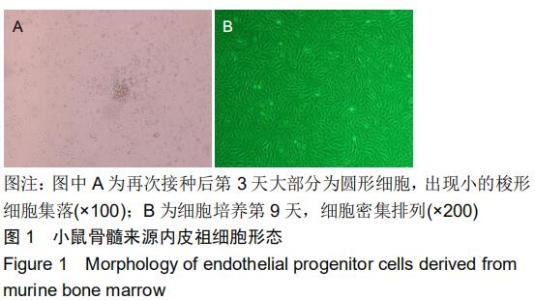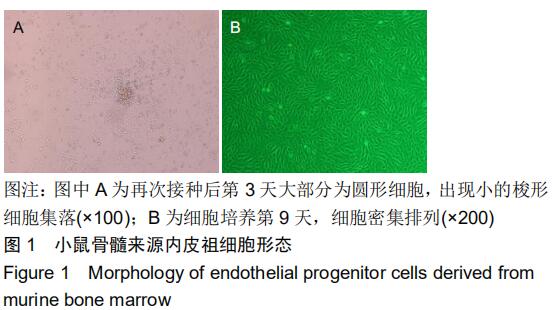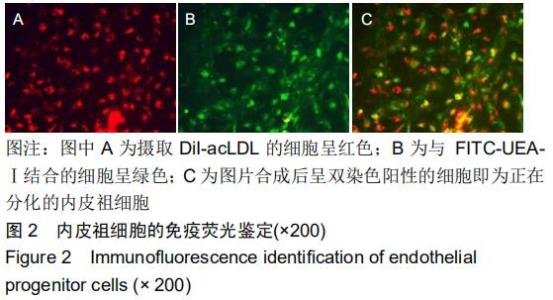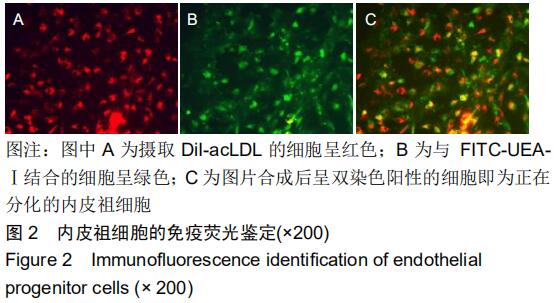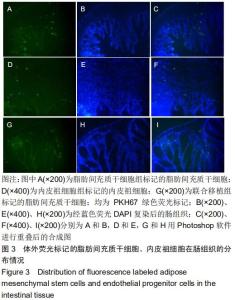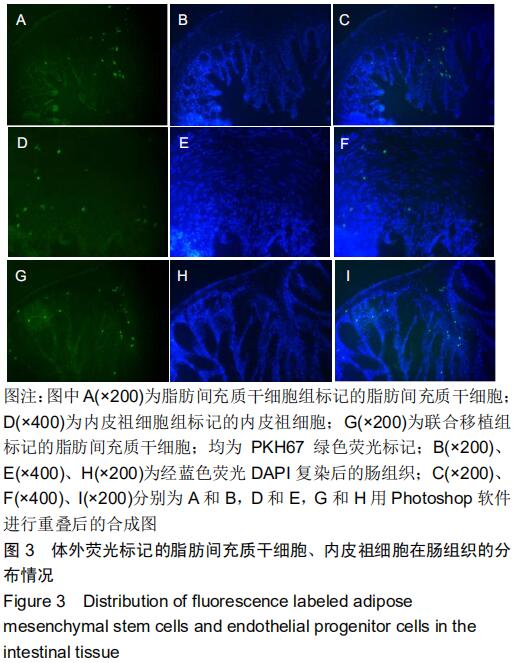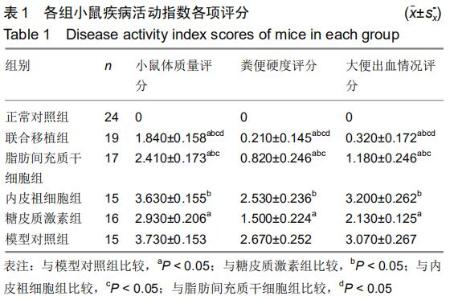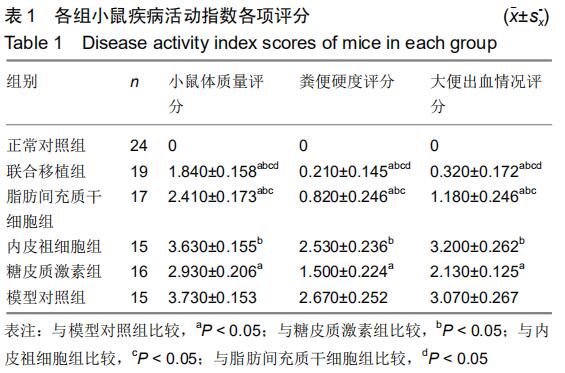|
[1] ROSE WA 2ND, SAKAMOTO K, LEIFER CA. Multifunctional role of dextran sulfate sodium for in vivo modeling of intestinal diseases. BMC Immunol. 2012;13:41.
[2] FANG K, BRUCE M, PATTILLO CB, et al.Temporal genomewide expression profiling of DSS colitis reveals novel inflammatory and angiogenesis genes similar to ulcerative colitis. Physiol Genomics. 2011;43(1):43-56.
[3] LIN KC, YIP HK, SHAO PL, et al. Combination of adipose-derived mesenchymal stem cells (ADMSC) and ADMSC-derived exosomes for protecting kidney from acute ischemia-reperfusion injury. Int J Cardiol. 2016;216:173-185.
[4] ZHANG JB, WANG XQ, LU GL, et al. Adipose-derived mesenchymal stem cells therapy for acute kidney injury induced by ischemia-reperfusion in a rat model. Clin Exp Pharmacol Physiol. 2017;44(12):1232-1240.
[5] SHEASHAA H, LOTFY A, ELHUSSEINI F, et al. Protective effect of adipose-derived mesenchymal stem cells against acute kidney injury induced by ischemia-reperfusion in Sprague-Dawley rats. Exp Ther Med. 2016;11(5):1573-1580.
[6] YANG C, WANG G, MA F, et al. Repeated injections of human umbilical cord blood-derived mesenchymal stem cells significantly promotes functional recovery in rabbits with spinal cord injury of two noncontinuous segments. Stem Cell Res Ther. 2018;9(1):136.
[7] CHEN Z, CHEN L, ZENG C, et al. Functionally Improved Mesenchymal Stem Cells to Better Treat Myocardial Infarction. Stem Cells Int. 2018;2018:7045245.
[8] RACKWITZ L, REICHERT JC, HAVERSATH M, et al. Cell-based and future therapeutic strategies for femoral head necrosis. Orthopade. 2018;47(9):770-776.
[9] DURAN NE, HOMMES DW. Stem cell-based therapies in inflammatory bowel disease: promises and pitfalls. Therap Adv Gastroenterol. 2016;9(4):533-547.
[10] RURALI E, BASSETTI B, PERRUCCI GL, et al. BM ageing: Implication for cell therapy with EPCs. Mech Ageing Dev. 2016;159:4-13.
[11] CHONG MS, NG WK, CHAN JK. Concise Review: Endothelial Progenitor Cells in Regenerative Medicine: Applications and Challenges. Stem Cells Transl Med. 2016; 5(4):530-538.
[12] SUN K, ZHOU Z, JU X, et al. Combined transplantation of mesenchymal stem cells and endothelial progenitor cells for tissue engineering: a systematic review and meta-analysis. Stem Cell Res Ther. 2016;7(1):151.
[13] GAROLLA A, D'INCÀ R, CHECCHIN D, et al. Reduced endothelial progenitor cell number and function in inflammatory bowel disease: a possible link to the pathogenesis. Am J Gastroenterol. 2009;104(10):2500-2507.
[14] MASUDA J, MITSUYAMA K, YAMASAKI H, et al. Depletion of endothelial progenitor cells in the peripheral blood of patients with ulcerative colitis. Int J Mol Med. 2007;19(2):221-228.
[15] DENG X, SZABO S, CHEN L, et al. New cell therapy using bone marrow-derived stem cells/endothelial progenitor cells to accelerate neovascularization in healing of experimental ulcerative colitis. Curr Pharm Des. 2011;17(16):1643-1651.
[16] 侯晓琳,郁卫东,崔梅花,等.小鼠脂肪间充质干细胞的分离培养及肠道归巢[J].中国组织工程研究,2015,19(6):854-860.
[17] OBERMEIER F, DUNGER N, STRAUCH UG, et al. Contrasting activity of cytosin-guanosin dinucleotide oligonucleotides in mice with experimental colitis. Clin Exp Immunol. 2003;134(2):217-224.
[18] YANG YJ, LI XL, XUE Y, et al. Bone marrow cells differentiation into organ cells using stem cell therapy. Eur Rev Med Pharmacol Sci. 2016;20(13):2899-2907.
[19] GUO Q, WANG J. Effect of combination of vitamin E and umbilical cord-derived mesenchymal stem cells on inflammation in mice with acute kidney injury. Immunopharmacol Immunotoxicol. 2018;40(2):168-172.
[20] LEE SJ, RYU MO, SEO MS, et al. Mesenchymal Stem Cells Contribute to Improvement of Renal Function in a Canine Kidney Injury Model. In Vivo. 2017;31(6):1115-1124.
[21] KO JH, LEE HJ, JEONG HJ, et al. Mesenchymal stem/stromal cells precondition lung monocytes/macrophages to produce tolerance against allo- and autoimmunity in the eye. Proc Natl Acad Sci U S A. 2016; 113(1):158-163.
[22] 赵红月,张丽蕊,陈乃耀.间充质干细胞移植后免疫调节作用的研究进展[J].山东医药,2017,57(2):101-103,104.
[23] KARIMINEKOO S, MOVASSAGHPOUR A, RAHIMZADEH A, et al. Implications of mesenchymal stem cells in regenerative medicine. Artif Cells Nanomed Biotechnol. 2016;44(3): 749-757.
[24] FONTAINE MJ, SHIH H, SCHÄFER R, et al. Unraveling the Mesenchymal Stromal Cells' Paracrine Immunomodulatory Effects. Transfus Med Rev. 2016;30(1):37-43.
[25] LUZ-CRAWFORD P, DJOUAD F, TOUPET K, et al. Mesenchymal Stem Cell-Derived Interleukin 1 Receptor Antagonist Promotes Macrophage Polarization and Inhibits B Cell Differentiation. Stem Cells. 2016;34(2):483-492.
[26] NOURIAN DEHKORDI A, MIRAHMADI BABAHEYDARI F, CHEHELGERDI M, et al. Skin tissue engineering: wound healing based on stem-cell-based therapeutic strategies. Stem Cell Res Ther. 2019;10(1):111.
[27] CHICHARRO D, CARRILLO JM, RUBIO M, et al. Combined plasma rich in growth factors and adipose-derived mesenchymal stem cells promotes the cutaneous wound healing in rabbits. BMC Vet Res. 2018;14(1):288.
[28] MARTINELLO T, GOMIERO C, PERAZZI A, et al. Allogeneic mesenchymal stem cells improve the wound healing process of sheep skin. BMC Vet Res. 2018;14(1):202.
[29] SU P, TIAN Y, YANG C, et al. Mesenchymal Stem Cell Migration during Bone Formation and Bone Diseases Therapy. Int J Mol Sci. 2018;19(8). pii: E2343.
[30] PEREZ JR, KOUROUPIS D, LI DJ, et al. Tissue Engineering and Cell-Based Therapies for Fractures and Bone Defects. Front Bioeng Biotechnol.2018;6:105.
[31] LIU Z, CHANG H, HOU Y, et al. Lentivirus‑mediated microRNA‑26a overexpression in bone mesenchymal stem cells facilitates bone regeneration in bone defects of calvaria in mice. Mol Med Rep. 2018;18(6):5317-5326.
[32] KHALIL PN, WEILER V, NELSON PJ, et al. Nonmyeloablative stem cell therapy enhances microcirculation and tissue regeneration in murine inflammatory bowel disease. Gastroenterology. 2007;132(3):944-954.
[33] SUZUKI E, FUJITA D, TAKAHASHI M, et al. Stem cell-derived exosomes as a therapeutic tool for cardiovascular disease. World J Stem Cells. 2016;8(9):297-305.
[34] HAYASHI Y, TSUJI S, TSUJII M, et al. Topical implantation of mesenchymal stem cells has beneficial effects on healing of experimental colitis in rats. J Pharmacol Exp Ther. 2008; 326(2):523-531.
[35] 温丽.血管内皮祖细胞对大鼠骨髓间充质干细胞生物学特性调控作用的研究[D].西安:第四军医大学,2013.
[36] LIN RZ, MORENO-LUNA R, LI D, et al. Human endothelial colony-forming cells serve as trophic mediators for mesenchymal stem cell engraftment via paracrine signaling. Proc Natl Acad Sci U S A. 2014;111(28):10137-10142.
[37] ZHANG X, WEI M, ZHU W, et al. Combined transplantation of endothelial progenitor cells and mesenchymal stem cells into a rat model of isoproterenol-induced myocardial injury. Arch Cardiovasc Dis. 2008;101(5):333-342.
[38] ZIGDON-GILADI H, BICK T, LEWINSON D, et al. Co-transplantation of endothelial progenitor cells and mesenchymal stem cells promote neovascularization and bone regeneration. Clin Implant Dent Relat Res. 2015; 17(2):353-359.
[39] SUKPAT S, ISARASENA N, WONGPHOOM J, et al. Vasculoprotective effects of combined endothelial progenitor cells and mesenchymal stem cells in diabetic wound care: their potential role in decreasing wound-oxidative stress. Biomed Res Int. 2013;2013:459196.
|
